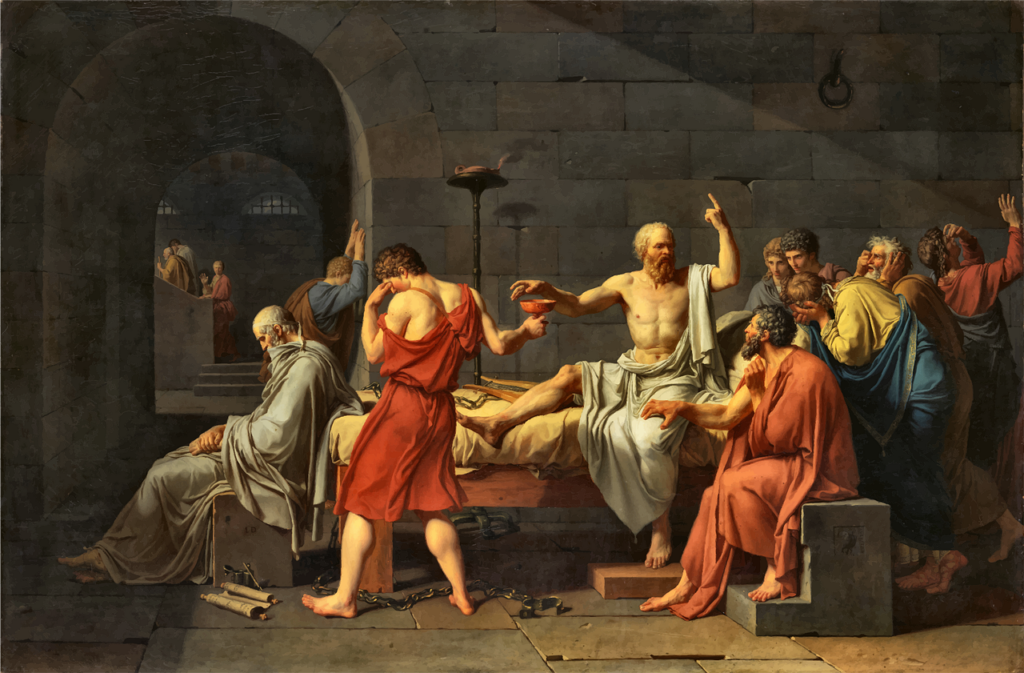The Greek philosopher Socrates is considered the father of Western philosophy. He is one of the most famous philosophers in history, known for his wisdom and dialectic method of reasoning.
He was born in Athens, Greece around 470 BC, and spent his life teaching, debating, and writing about philosophy. He is credited with founding Western philosophy and is famous for his Socratic method of questioning, which involves probing a person’s beliefs and reasoning in order to get to the truth of a matter.
He was a man of great wisdom and intellect, and his ideas have had a profound impact on the world for over two thousand years. Even today, his legacy continues to shape the way we think about knowledge, morality, and politics.
His teachings were influential to many later philosophers, including Plato and Aristotle. He was eventually sentenced to death for his ideas, but he is remembered as one of the most influential thinkers in history and his legacy still stands.
Why does Socrates still hold relevance today

- His commitment to the search for truth:
The search for truth was at the heart of Socrates’ philosophical mission. He believed that it was not enough to simply accept the status quo or repeat what others said, but rather to question everything and seek out the true nature of reality.
This idea is encapsulated in his famous saying, “The unexamined life is not worth living.” To Socrates, the search for truth was not just an academic pursuit, but rather a fundamental part of living a good and meaningful life. For him, the pursuit of knowledge was a moral obligation and the foundation of virtue.
This commitment to the search for truth also led Socrates to challenge authority and power. He said, “The only true wisdom is in knowing you know nothing.”
He believed that the established authorities of his time, such as politicians and religious leaders, often presented themselves as having all the answers, but that true wisdom lay in admitting one’s own ignorance and questioning everything.
This radical attitude was a major part of what made Socrates so influential and controversial in his time.
- His ideas about ethics and morality:
Socrates believed that all people should strive to live virtuous lives, guided by reasoning and logic rather than emotion. He emphasized the importance of thinking critically about one’s own beliefs and actions and considered this process to be essential for living a good life.
- The Socratic method:
Socrates is best known for his use of the Socratic method, a form of critical thinking that involves questioning assumptions and seeking clarity through dialogue.
In a typical Socratic dialogue, the teacher (often Socrates himself) would ask a series of questions to a student.
These questions would be designed to lead the student to a deeper understanding of the topic, often through self-reflection and critical thinking.
The goal of the Socratic method is not to simply impart knowledge, but to help students learn to think for themselves. This Socratic method being very applicable to modern-day teaching and learning has remained a factor for Socrates’ relevance.
- His teachings:
One of the most famous teachings of Socrates is the concept of the examined life. This idea holds that the most important thing in life is to constantly question and examine one’s own beliefs and assumptions.
Socrates believed that this process of self-examination was the path to wisdom and virtue. He also emphasized the importance of rational thinking and the use of logic to understand the world.
This emphasis on reason and critical thinking was a radical idea in ancient Greece, where religion and myth were the dominant forces.
He also had a lot to say about politics and democracy. He said, “The only true democracy is one in which the people know how to vote, but also how to refuse the right to vote.”
This statement highlights the importance of an informed and educated electorate in a functioning democracy.
It also shows that Socrates believed that democracy required more than just voting, it required an engaged and active citizenry.
Socrates with his teachings was undoubtedly a tough meat for politicians, often at odds with the authorities of his time.
He was critical of their reliance on rhetoric and propaganda and believed that they were not genuinely interested in pursuing the truth. This attitude got him into trouble on more than one occasion.
In 399 BC, he was put on trial and accused of corrupting the youth of Athens and impiety. Despite a spirited defense, he was found guilty and sentenced to death. His execution was a dark moment in the history of philosophy and democracy.
- Plato’s work:
Plato, a student of Socrates, was a major figure in the development of Western philosophy, and his work helped to ensure the continued relevance of Socrates’ ideas.
Plato recorded many of Socrates’ ideas and teachings in his writings, including the famous Socratic dialogues. These texts preserved the spirit and teachings of Socrates, even after his death.
Plato also built upon Socrates’ ideas, developing them further and adding his insights. His actions in preserving and developing Socrates’ ideas helped him to become one of the most influential philosophers of all time.
The influence of Socrates can also be seen in the works of many modern philosophers, such as Karl Popper and John Rawls. Even today, his call for rational thinking and critical examination of ideas remains relevant and powerful.
- Religion incoherence:
Socrates was born and raised in a polytheistic society, and it is believed that he was familiar with the traditional Greek gods and religious practices.
However, he is not known to have been a particularly religious man, and in fact, he often criticized the superstitious nature of popular religious beliefs.
Instead, Socrates seemed to be more interested in philosophical and ethical questions, rather than religious doctrine, this greatly contributed to his modern-day relevance as not everyone identifies with religion.
Some scholars have even argued that he was an atheist, though a conclusion on this may be difficult to prove. Especially because he didn’t directly teach about religion.
Read Also: Did Socrates believe in god?
There are many spiritual connections that have been made to the life and teachings of Socrates. Many have seen his ideas as having a strong connection to various religions and spiritual traditions.
For example, some have noted the similarities between the Socratic method and the Jewish tradition of Talmudic study, which also involves questioning and debating. Others have drawn parallels between Socrates’ ideas about virtue and the teachings of Buddhism.
Still, others have seen similarities between his views on the soul and the afterlife and the traditions of Christianity. In this way, many people have found spiritual meaning and connection in the ideas of Socrates but not to say he belongs to any.
Conclusion
Socrates’ death did not mark the end of his influence. His legacy has continued to spread and shape the development of philosophy and political thought for centuries.
While Socrates lived and taught over two thousand years ago, his ideas are still highly relevant today. Many of his ideas about virtue, justice, and the search for truth continue to resonate with people all over the world.
His Socratic method is also still widely used in education and philosophy, and many people continue to study his works and apply his ideas to their own lives.
Even today, people are inspired by his dedication to the pursuit of knowledge and wisdom and his commitment to thinking critically and rationally. In this way, Socrates remains a highly relevant and influential figure in today’s world.
Share

